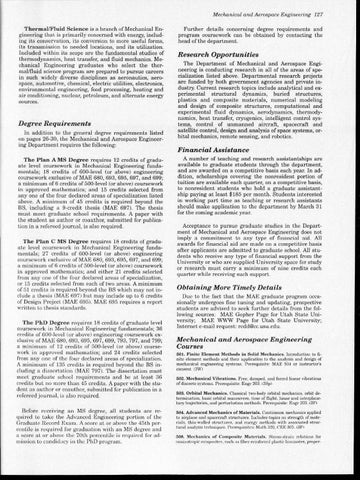Mechanical and Aerospace Engineering 127
Thermal/Fluid Science is a branch of Mechanical Engineering that is primarily concerned with energy, including its conservation, its conversion to more useful forms, its transmission to needed locations, and its utilization. Included within its scope are the fundamental studies of thermodynamics, heat transfer, and fluid mechanics. Mechanical Engineering graduates who select the thermaVfluid science program are prepared to pursue careers in such widely diverse disciplines as aeronautics, aerospace, automotive, chemical, electric utilities, electronics, environmental engineering, food processing, heating and air conditioning, nuclear, petroleum, and alternate energy sources.
Degree Requirements In addition to the general degree requirements listed on pages 26-30, the Mechanical and Aerospace Engineering Department requires the following:
The Plan A MS Degree requires 12 credits of graduate level coursework in Mechanical Engineering fundamentals; 18 credits of 600-level (or above) engineering coursework excl usive of MAE 680, 693, 695, 697, and 699; a minimum of 6 credits of 500-level (or above) coursework in approved mathematics; and 15 credits selected from any one of the four declared areas of specialization listed above. A minimum of 45 credits is required beyond the BS, inc) uding a 9-credit thesis (MAE 697). The thesis must meet graduate school requirements. A paper with the student as author or coauthor, submitted for publication in a refereed journal, is a lso required. The Plan C MS Degree requires 18 credits of graduate level coursework in Mechanical Engineering fundamentals; 27 credits of 600-level (or above) engineering coursework exclusive of MAE 680, 693, 695, 697, and 699; a minimum of 6 credits of 500-level (or above) coursework in approved mathematics; and either 21 credits selected from any one of the four declared areas of specialization, or 15 credits selected from each of two areas. A minimum of 51 credits is required beyond the BS which may not include a thesis (MAE 697) but may include up to 6 credits of Design Project (MAE 695). MAE 695 requires a report written to thesis standards. The PhD Degree requires 18 credits of graduate level coursework in Mechanical Engineering fundamentals; 36 credits of 600-level (or above) engineeri ng coursework exclusive of MAE 680, 693, 695, 697, 699, 793, 797, and 799; a minimum of 12 credits of 500-level (or above) coursework in approved mathematics; and 24 credits selected from any one of the four declared areas of specialization. A minimum of 135 credits is required beyond the BS including a dissertation (MAE 797). The dissertation must meet graduate school requirements and be at least 36 credits but no more than 45 credits. A paper with the student as author or coauthor, submitted for publication in a refereed journal, is a lso required. Before receiving an MS degree, all students are required to take the Advanced Engineering portion of the Graduate Record Exam. A sco re at or above the 45th perce ntile is required fOr graduation with an MS degree and a sco re at or above the 70th percentil e is rcquirC'd for admission to candidacy in the PhD program.
Further details concerning degree requirements and program coursework can be obtained by contacting the head of the department.
Research Opportunities The Department of Mechanical and Aerospace Engineering is conducting research in all of the areas of specialization listed above. Departmental research projects are funded by both government agencies and private industry. Current research topics include analytical and experimental structural dynamics, buried structures, plastics and composite materials, numerical modeling and design of composite structures, computational and experimental fluid dynamics, aerodynamics, thermody· namics, heat transfer, cryogenics, intelligent control systems, control of unmanned aircraft, spacecraft and satellite control, design and analysis of space systems, orbital mechanics, remote sensing, and robotics.
Financial Assistance A number of teaching and research assistantships are available to graduate students through the department, and are awarded on a competitive basis each year. In addition, scholarships covering the nonresident portion of tuition are available each quarter, on a competitive basis, to nonresident students who hold a graduate assistant· ship paying at least $185 per month. Students interested in working part time as teaching or research assistants should make application to the department by March 31 for the coming academic year. Acceptance to pursue graduate studies in the Depart· ment of Mechanical and Aerospace Engineering does not imply a commitment to any type of financial aid . All
awards for financial aid are made on a competitive basis after applicants are admitted to graduate school. All students who receive any type of financial support from the University or who are supplied University space for study or research must carry a minimum of nine credits each quarter while receiving such support.
Obtaining More Timely Details Due to the fact that the MAE graduate program occasionally undergoes fine tuning and updating, prospective students are advised to seek further details from the following sources: MAE Gopher Page for Utah State University; MAE WWW Page for Utah State University; Internet e- mail request: redd@cc.usu.edu.
Mechanical and Aerospace Engineering Courses 501. Finite Element Methods in Solid Mechanics. Introduction to fi. nite element methods and their application to the analysis and design of mechanical engineering systems. Pt-erequisite: MAE 504 or instructor's consent. (3W) 502. Mechanical Vibrations. Free, damped, and forced linear vibrations of discrete systems. Prerequisite: Engr 203. t3Sp) 503. Orbital Mechanics. Classical two·body orbital mechanics. orbit de· termination. basic orbital maneuvers. tim£> of flight. lunar and interplanetary trajectories, and perturbation methods. Prerequisite: Engr 203. 13Fl 504. Advanced Mechanics of Matedals. Continuum mechanics applied to a it-plane and spacecrall strucltu"('S. Includes topics on strength of materials. thiu·walled structures. aud ('tll"rgy methods with associated st mct uml analysis f('c\miquC's . PrNPquisitPs: Math 320. CEE 305. (3Fl 50ft Mechnnics of Composite Mut<'rials. StrC'SS·stmin relations for !l011isotropir con1po.;;ites. sudt as lilwr·rt>illl"orrl'd pbstir lamitmtes. proper·
